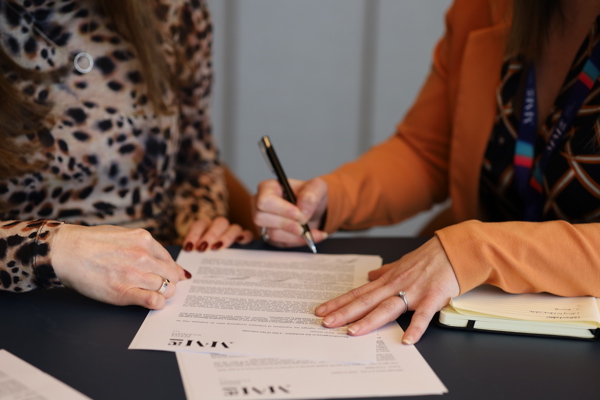"Not flesh of my flesh,
nor bone of my bone,
But still miraculously my own.
Never forget for a single minute,
You didn’t grow under my heart
But in it."
– Fleur Conkling Heyliger
This week we are supporting Adoption Week Scotland. It runs from 3rd November to 7th November 2025 and the theme of AWS is ‘Growing our family through adoption’. This is a week to increase awareness of adoption and share information around how people can transform a child's life, and their own, by growing their family through adoption.
A programme of events can be found here.
Going through the process of adoption can be both an exciting and daunting time for everyone involved. It's important to have the right legal advice and support at that time. Adoption itself is a huge milestone for a child and their new family and it is, of course, the start of a new family unit. For many adopted children, they carry the impact of early experiences of trauma and loss. They require sensitive, reparative parenting and ongoing support in understanding their life story. So, post-adoption support is also very important for families.
I hope that this week will raise awareness of the reality of what adoption involves and inspire potential adopters to take the next step and explore the possibility of adopting a child and growing their family.
If you would like to know more about the legal side of adoption, see our adoption FAQ here.
Adoption FAQ
To mark Adoption Week Scotland 2025, our Karen Wylie, Legal Director, considers some common questions in relation to the legal side of the adoption process.
Married couples, civil partners, cohabiting couples and single people can all apply to adopt a child. For those who are cohabiting, they need to demonstrate that they are in an 'enduring family relationship', but there is no minimum length of time that the couple would need to have cohabited. In a recent case, it was held that a separated couple could also adopt where they continued to have 'a cohesive, integrated family life together'. This development is new; whether an adoption by separated parents is suitable for a child is likely to depend on the specific circumstances of each case.
Prospective adopters must normally be at least twenty-one.
There is no strict upper age limit for adoption in Scotland. The age of the prospective adopters, however, will be considered at various stages of the process.
If a relative or stepparent wishes to adopt a stepchild or another close relative, such as a niece or nephew, then they or their solicitor will need to advise the Local Social Work Department that an adoption application is to be made. The Social Work Department will then prepare a report for the court. This report speaks to the suitability of the applicants and speaks to all the relevant factors as to whether the adoption should be granted. Your solicitors would then prepare the adoption application (called a Petition) and lodge it with the Sheriff Court, and the process will follow a very similar procedure to the process below.
Where a child has been placed with prospective adopters by an adoption agency or local authority, the social workers involved will normally have a report underway which speaks to the suitability of the applicants and discusses all the relevant factors as to whether the adoption should be granted. The adoptive parents would identify a solicitor who would prepare the adoption application (called a Petition) and lodge it with the Sheriff Court (or less commonly the Court of Session). The application can only be made once the child has been with his prospective adopters for at least thirteen weeks and the child must have reached the age of nineteen weeks old.
After the adoption petition is lodged, a first hearing (a 'preliminary hearing') is fixed and the court grants permission to serve the petition on the birth parents and also arranges a report to be prepared for the court by a Curator Ad Litem.
At the first hearing, assuming the application is unopposed, and the Sheriff or Judge is persuaded that the application should be granted having regard to the circumstances of the case and the statutory tests, the adoption may be granted.
If the application is defended, the court will fix an evidential hearing (a proof) to consider the application in detail with reference to witness evidence presented by both sides.
There is a lengthy process prior to the application being made and that can take some time. However, once the application is lodged, the court process tends to move relatively swiftly. The first hearing is usually fixed around six to eight weeks or so after the adoption petition is lodged with the court. All being well, if unopposed, the adoption could be granted at the first hearing.
If the petition is defended, then the application can take much longer to be resolved.
The adoption order granted by the court irrevocably cuts the legal ties between a child and their birth parents (unless it is a stepparent adoption where only ties to one birth parent are removed). The child's birth parents will no longer have any parental rights and responsibilities in relation to the child.
The adoptive parents gain full responsibilities and rights in relation to the child and the child is treated in all respects as their natural child.
Only a child who is under 18, who has never been married or in a civil partnership, can be adopted.
If the child is aged 12 or over, then the child will also need to agree to the adoption. If the child is under 12, then their views must be taken into account if the court decides that they are mature enough to have a view on the adoption.


